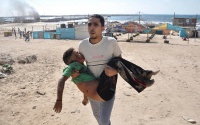Home » Libya » PAL/ISR - News » Alkarama Launches Public Report on the "2014 Operation Protective Edge: Violating the Laws of War"
On 8 July 2014, Israel launched "Operation Protective Edge" which, in just 50 days, up to 26 August, claimed more than 2,000 lives, 70% of whom were civilians, displaced over half a million people and destroyed hundreds of civilian buildings. Alkarama's research team in the Gaza Strip gathered testimonies, from survivors and witnesses, on 62 assaults that left 280 civilians dead and destroyed numerous civilian objects, among which several schools and hospitals. Over 70% of the casualties were children, women and men over 60, while a third of the victims were children below the age of 10.
In its report, Alkarama argues that the deliberate targeting of civilian buildings constitutes a violation of the three core principles of international humanitarian law, namely the principles of distinction, proportionality and precaution. The attacks on civilian homes in one of the the most densely populated area in the world, mostly conducted at night and without any warning, demonstrate the indiscriminate and disproportionate nature of these attacks.
"Affirming the contrary would entail that the Israeli military strategy is one of collective punishment of civilians," stated Inès Osman, Legal Officer for the Mashreq at Alkarama. "It is extremely worrisome to see that unlawful tactics of war, which put the lives of thousands of civilians at risk, were selected deliberately," she continued. "This shows the recklessness, if not the willingness, to employ such tactics."
In its report, Alkarama contends that these violations amount to war crimes and could even amount to crimes against humanity due to their widespread scale and systematic pattern, and regretted that no step had been taken to ensure that the perpetrators are brought to justice, despite the UN's repeated calls on the Israeli authorities to open investigations into the crimes committed in the Occupied Palestinian Territories.
In view of the gravity of these abuses, Alkarama called upon international instances, UN Members States and all other stakeholders to fully support the efforts of both the Commission of Inquiry and the International Criminal Court (ICC) which opened an investigation in January 2015, so that so that those responsible are held accountable. The Commission of Inquiry, whose Chairperson Professor Schabas resigned in February 2015, requested on 9 March 2015 a deferral of their report until the June session of the Human Rights Council.
For more information or an interview, please contact the media team at This email address is being protected from spambots. You need JavaScript enabled to view it. (Dir: +41 22 734 1007 Ext: 810)
organised by the Khiam Rehabilitation Centre for Victims of Torture
 Algeria
Algeria Bahrain
Bahrain Djibouti
Djibouti Egypt
Egypt Iraq
Iraq Palestine/Israel
Palestine/Israel Jordan
Jordan Kuwait
Kuwait Lebanon
Lebanon Libya
Libya Mauritania
Mauritania Morocco
Morocco Oman
Oman Qatar
Qatar Saudi Arabia
Saudi Arabia Sudan
Sudan Syria
Syria Tunisia
Tunisia United Arab Emirates
United Arab Emirates Yemen
Yemen Other Countries
Other Countries


